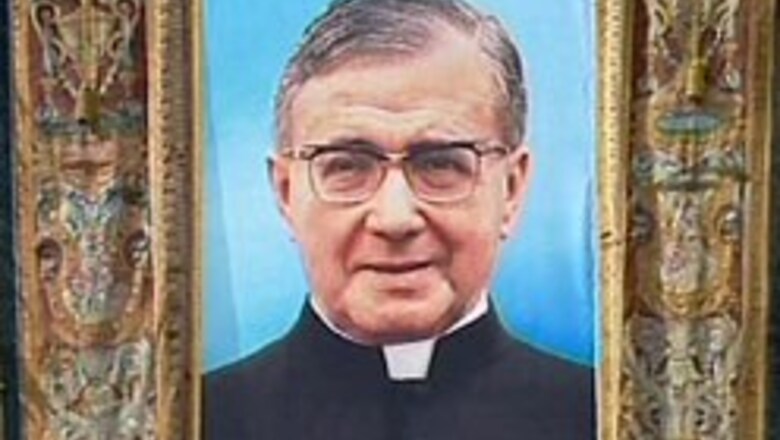
views
The following is a summary of this week's time.com cover story on one of the most controversial groups in Catholicism, Opus Dei.
With no more than 3,000 members in the United States and 85,000 worldwide, this offshoot of the Catholic church has been accused of using lavish riches and carefully cultivated clout to do everything from propping up Francisco Franco's Spanish dictatorship in the 1950s to pushing through its founder's premature sainthood to planting conservative minions in governments from Warsaw to Washington.

But most of all, it has been known for its silence.
Now, the leaders of the organisation are speaking up. Nudging them to talk has been the huge success of Dan Brown's The Da Vinci Code, a book — and now movie — that depicts the organisation as a group of religious fanatics.
But while the group's public relations offensive has been informative, it hasn't quite managed to close the gap between what critics say Opus Dei is about and its own version of the story.
Time magazine has taken a look inside the organisation to try and answer some of the questions that have dogged it for years.
How did it start?
On October 8, 1928, a 26-year-old Spanish priest named Josemaría Escrivá was visited by a new vision of Catholic spirituality: A movement of pious laypeople who would, by prayerful contemplation and the dedication of their labor to Christ, extend the holiness that they experienced in church on Sunday into their everyday work life.
Escrivá's title for the movement was a literal description — Opus Dei means "the work of God" — and his ambitions for it were no joke. He saw Opus eventually acting as "an intravenous injection (of holiness) in the bloodstream of society."
Who are these people?
All Opus members take part in a rigorous course of spiritual "formation" stressing church doctrine and contemplation plus Escrivá's philosophy of work and personal holiness, which is collected in works like his book, The Way.
But its core is its "numeraries," the 20 per cent who, despite remaining lay, pledge celibacy, live together in one of its 1,750 sex-segregated "centres" and extend their training to a degree rivaling a priest's — all the while holding day jobs whose paychecks they pass on to the organisation.
The remaining 70 per cent of the membership, called supernumeraries, are much more of this world. They fit Opus' daily two hours of religious observance around a more typical, or perhaps retro, given the large size of many of their families’ existence.
PAGE_BREAK
How secretive is Opus?
For all its uniqueness in mission and structure, Opus Dei is unquestionably best known for being "secretive."
It has a supposedly secret greeting: "Pax" and "In aeternum" ("Peace" and "In eternity.") and its 1950 constitution barred members from revealing their membership without permission from the director of their centre.

How rich is it?
The total global assets have been estimated to be around $2.8 billion. If correct, that sum approximately equals Duke University's endowment.
But that figure is only part of the picture. There may yet be significant submerged funds: Opus members and its sympathizers, known as "cooperators," can be very generous, and their gifts hard to track.
John Allen, a respected print and television Vatican commentator, reports that one apparently unexpected $60 million gift financed much of the Manhattan building.
PAGE_BREAK
How much power do they have?
Some have said that Opus' true secret is its clout in international politics, usually through church-connected parties. Poland's new conservative regime includes an Opus minister and several Opus officials, according to one of the group's Warsaw directors; membership there is rumored to be a political stepping-stone.

For years, Catholics in Washington have kept informal count of possible high-profile Opus people, including Justice Antonin Scalia and almost-Justice Robert Bork, Republican Senators Rick Santorum and Sam Brownback, columnist Robert Novak and former FBI head Louis Freeh.
Do they really whip themselves?
The man performing the penance advised his associate to cover his head with a blanket; but the observer could not stop his ears. "Soon," said the shocked witness, "I began to hear the forceful blows of his discipline...there were more than a thousand terrible blows, precisely timed. The floor was covered in blood."
That passage is not an early Da Vinci Code draft. It is a description of Opus Dei founder Escrivá's routine by his eventual successor, quoted in a biography of Escrivá. Escrivá emphasised that others should not emulate his ferocity.
PAGE_BREAK
What about rumours of mind control?
Dozens of unnerving stories have been passed by ex-numeraries to journalists or posted on the web site of the Opus watchdog group Odan. Many involve charges of deceptive recruiting, with a numerary realising only belatedly that Opus expects him to sign away his paycheck and drastically curtail relations with his family.
And when the numeraries attempt to leave, they are threatened with damnation. Experts who have helped extract the disaffected have compared centre life to a cult.
What is Opus' future?
"I don't believe Opus Dei is either a (cult) or a Mafia or a cabal," a senior prelate of another religious community in Rome told Time. It is just that "their approach is preconciliar.
They originated before the Second Vatican Council, and they don't want to dialogue with society. Their approach is to 'Christianise' it."
If that is the case, if most of the negative feeling regarding Opus at this point is displaced anger over the direction of the church then The Da Vinci Code may be the best fate that could befall it. The movie will not deter Opus' usual constituency.
But by forcing Opus into greater transparency, the film could help it a great deal if the organisation is as harmless and "mature" as supporters contend, then such exposure could bring in a small bumper crop of devotees — with perhaps a larger one to come if, as seems likely, American Catholicism becomes both more Hispanic and more conservative.

















Comments
0 comment